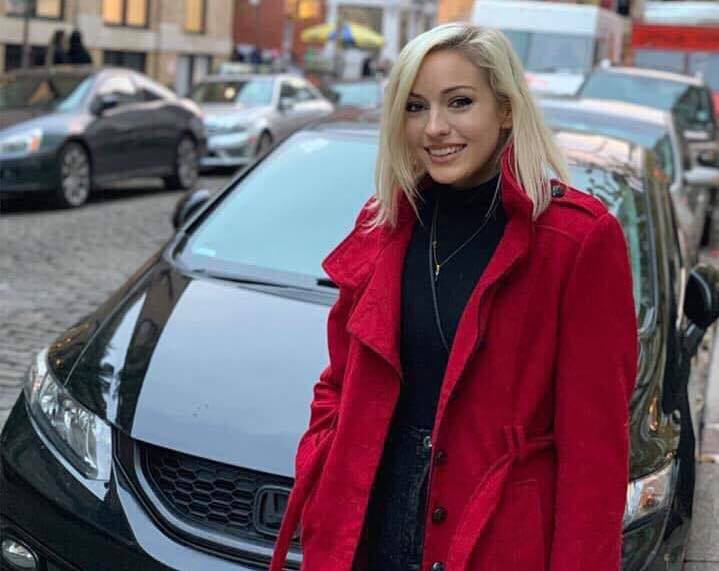Welcome to CENTER STAGE, where I interview individuals who work in the film industry. From actors to production assistants, from writers to the camera crew, from makeup artists to assistant directors, this is where tap into the insight of folks working in Hollywood.
An Interview with Mandee Youse
From making home movies to renting Shirley Temple classics, Mandee Youse has been fascinated by Hollywood for as long as she can remember. Her dreams of working at a major film studio started with becoming a set production assistant for film and television. She has now moved up into the world of visual effects, with credits including the Netflix film Bright and the most recent DC hit Aquaman.
PZ: Congratulations on Aquaman! How did you get to be involved with such a big project?
MY: The way I became involved was through working on Bright, which was where I got into visual effects in the first place. I was working as a day-player with the assistant director (AD) department and one day they reached out asking me if I’d be interested in helping with their visual effects team since they were understaffed. So I made myself available, took direction well, and made a good impression. Then they reached out to ADs and asked if they could absorb me into the VFX team. Then I just finished out the rest of the movie with them. When it came time for finding new work, they brought me on as a day-player for Bird Box. Then they reached out again saying that Aquaman was looking for a VFX production assistant. The producer that hired me on Aquaman was the same producer from Bright. Then I got promoted to assistant coordinator.
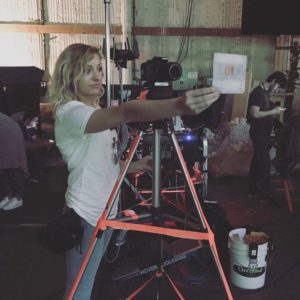
PZ: What were your duties as the assistant coordinator?
MY: They were to bring in all the shots that would come in from our overseas vendors, from Australia or New Zealand. Anything that would come over from early in the morning, I had to be there. We were working through a program called Shotgun which we used to manage all our shots and sequences. We would receive packages from vendors, then I would download them, put them in appropriate folders for our editorial team and made sure everyone was on the same page and knew where to find everything. Then the editorial team would cut them into sequences or reels and review it with our director James Wan.
PZ: And you got to work closely with James Wan?
MY: Yeah, I saw him every day. The coordinators would sit in on the reviews and take all the notes. So any shots that were reviewed and any comments by the director or VFX supervisors would be jotted down and relayed back to vendors. They would then make the appropriate changes with new cuts until everything was reviewed and finalized.
PZ: There are a lot of visual effects in Aquaman. How long were you working on it for?
MY: I was on it for an entire year, November 2017 to 2018. We had around 20 vendors, from pre-visual and post. They divided up all the sequences in order to meet the deadline. It got hectic towards the end, but they pulled it off.
PZ: Were visual effects something you’ve always wanted to do or did you just fall into it?
MY: It just fell into my lap and I actually really enjoyed it. It came to me at the perfect moment. I had already decided early in my career that I did not want to be an assistant director, so I wasn’t one of those PAs collecting my days and freaking out about how many credits I had. I was just doing it because it’s what I moved out to be a part of. At the same time, I had been looking for other avenues and this one just stuck. I’m continuing to move up in it. I’ve actually just started a new project recently.
PZ: So what initially sparked your interest in film?
MY: Ever since I was a kid, I was always that the one in my family who had a camera in my hand. I was sitting and writing scripts before I ever knew what a script was. I always had my sister be the star of my movies and my cousins and friends would get together, I’d be the director and shoot with one of those really big camcorders from the ’80s. We would just make little movies. As I grew up, I kinda forgot about it. But then I transferred to the University of Central Florida, and that was a happy accident because I was gonna study psychology. I went to my orientation and accidentally got into the wrong line which led me to the radio and television production office to speak with the guidance counselors. I saw these pamphlets about the different classes to take. I brought it to a guidance counselor and asked if it was a club or class. That’s when she told me that this was a major, and I decided right then and there to switch my major, and it worked out perfectly. I needed to have four pre-req classes in order to have the possibility of transferring. There was one seat available in all four classes, so it was kinda meant to be. I was also part of the RTV program in high school, like morning announcements and TV programs. So it was always in my blood.
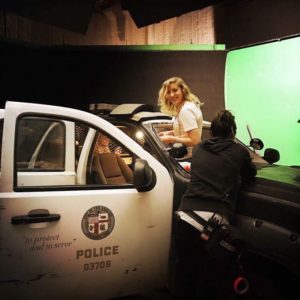
PZ: And how did you start?
MY: After I got accepted, I was really doing well. So I started looking for internships, I knew I wanted to come out to California, I had my heart set on it. I didn’t know anybody out here, so it was actually my dad’s cousin, David Youse, who had a friend who knew someone who put me in contact with Evolution Media, and I applied for an unpaid internship. They were willing to bring me on as an intern, and due to CA state law, I had to at least be earning college credit. So I postponed my graduation by one semester in order to come out here for free (laughs). But it really paid off in the long run. I started out interning for a reality show called Vanderpump Rules, which was exciting because I actually watched that show in college. It was for three months, and at the end, I was approached by line producer for Botched on E!. They interviewed me on the spot and basically hired me to be their clearance coordinator for the second season. I went back to Florida, graduated, walked the stage, packed, and moved out to LA with a full-time job already. It was really stable and a nice steady way of coming to LA. Ultimately I had bigger dreams and really wanted to work at Warner Bros. It’s been a dream job. So I just started focusing on it and manifesting it into reality. It’s kinda silly, I would go on the Warner Bros. VIP Tour and visualized myself working there. Then through my dad’s cousin, I was introduced to a man named Peter Paige, who was the creator of The Fosters. I had expressed that I was interested in working on set and he told me he’d invite me to set one day. I came and met the assistant directors, then made a decent enough impression that they started calling me in for work as a day player, then became a regular.
PZ: How long were you day-playing for?
MY: Probably two years, just bouncing around from show to show, picking up work wherever I could. I was on The Fosters for Season three and four. I’ve also worked on Brooklyn Nine-Nine, The Voice, Jane the Virgin, and a few award shows. I got to be a part of the top-secret reboot for Will & Grace, which was really exciting. When I got the call for it, they used a codename and were really vague about it. All they told me was I would want to be a part of it. So I was the producer’s assistant for that. I showed up to CBS Radford Studios in Studio City, and they were filming that episode in the basement of where CSI was. It was super weird. I walked down to see they were still building the set. I was introduced to the producer and helping him get the office set up down there. After we came back from lunch, more of the set was finished. I started looking around and was like “Wait a minute, I know what this is.” That was an awesome experience, I worked closely with all four cast members, I got to drive Debra Messing around.
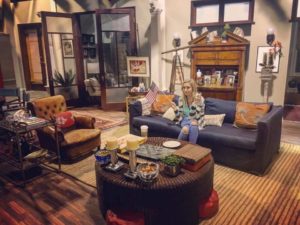
PZ: Any fun Will & Grace anecdotes to share?
MY: One day, Megan Mullally, who plays Karen, pulled up in a giant SUV, hopped out, looked at me, and said “I’m gonna need your help. I lost my earring, so I just need you to see if it’s on me somewhere or if it fell on the ground of the car.” I asked what it looked like, and she said it was a star. I looked around and saw that it was on her car seat. I reached into her car, pull it, and ask “Is this what you’re looking for?” She looks at me, takes my hand in both of her hands, makes eye contact with me, and says “You realize this means we’re married now?” (laughs). So that was my favorite moment ever because technically I’m married to Megan Mullally now.
PZ: And does she know that you’re here doing this interview?
MY: (Laughs) No!
PZ: How was your experience on Bright?
MY: It was awesome. I was really excited because it was on the first time on set not as a traditional PA. So I had other responsibilities. I was working with the VFX supervisor and getting green screens set up with tracking markers. I was responsible with getting some data wrangling, where I had to get the information of which camera was used and the distance from the lens to the object being filmed in order to get the correct dimensions for post-production. That was one of my favorite movies to work on, even though it was long hours and we were shooting in not the most glamorous of neighborhoods. They actually put me in the movie of the last day as background. I walked past wardrobe and they grabbed me and said: “You’ll fit, put this on.” I was an elf, so they put elf ears on me and some crazy wardrobe, for the Elf Town scene.
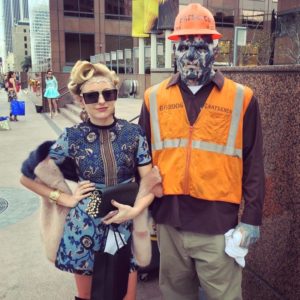
PZ: I gotta ask, how was working with Will Smith?
MY: I loved working with Will Smith! I was a little nervous because I have worked with certain actors who don’t live up to the fantasy of what you imagine them to be like in person. But in my experience, Will Smith was exactly how you’d imagine him to be. He is the Fresh Prince, he’s hilarious. And he’s from Philadelphia and I’m also from Pennsylvania, so I grew up an Eagles fan. One day on set, I was wearing an Eagles T-shirt and we had just won the game the night before. He would walk past me, see the shirt, and would make a reference to the Eagles every single time. He’s really humble and down to earth considering he’s a megastar. And if anybody came up to him while we were shooting in these neighborhoods, he would always take the time to say hello. He’s really good to his fans.
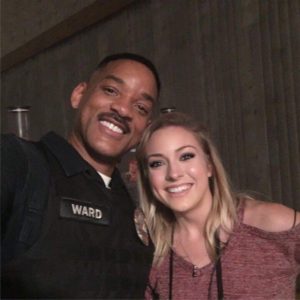
PZ: Now that you’ve been involved heavily with visual effects, would this be something you’d want to make a full-time career out of?
MY: Possibly. Right now, I’m enjoying where I’m at and making good connections that are helping me climb the ladder. Within the next five to ten years, I’m not sure if I’ll still be doing freelance work. I may want more steady studio work. I’m getting older, I would want to have a family one day. It’s hard to picture family life when you’re working on set for 16 hours a day.
PZ: That’s funny because we’re surrounded by freelancers and people way older than us with families working in this industry. You gotta wonder, how do you manage that?
MY: I know. And that’s something I haven’t figured that out yet. I’m a very observant person, especially on set. I listen to what people say about their experiences, like when I see mothers and even fathers who really only get to see their kids like through FaceTime. I remember being on set once and hearing an electrician saying “Well, I just said bye to my kids, I’m not gonna see them for the next three months.” And that hit me. Imagine both your parents working on set, it would be hard on families. So I haven’t had to cross that bridge yet, but when it gets closer, I’ll have to think of what else to do. Because I don’t wanna be one of those FaceTime moms.
PZ: Who were some of your cinematic influences growing up?
MY: There’s definitely not a particular director that I’ve always been fascinated by. I’m really into old movies, like old Hollywood classics. I was always kind of a weird kid, because every night before going to sleep, I would watch a Shirley Temple movie. I would also go to the video store with my dad. At least six times in a month, I would ask to rent West Side Story. I grew up admiring Marilyn Monroe, Audrey Hepburn, James Dean, and Humphrey Bogart. Which I think is another reason why I love being on studio lots, because it’s kind of a surreal thing to be working on a stage and seeing the plaques with all the productions listed that were filmed on that stage, like Casablanca. It’s like “Wow, I’ve never been so close to Humphrey Bogart in my life.” And on some weird plain, we’re both there at the same time, just different realities almost.
PZ: Going back to Aquaman, so many people have high expectations for films like those, especially on the technical side. Was there anything particularly striking about seeing these effects come to life?
MY: Honestly, there’s one scene that blew me away. Because you have to understand, shooting a movie like Aquaman is essentially Jason Momoa acting alone with nothing but blue screen. There wasn’t even that much atmosphere or environmental props. There’s one scene where he’s on the boat, and watching raw footage of him rolling around fighting air with nothing but a blue screen and then the layering and layering of him fighting the trench creatures, it blew my mind. You’re watching the raw footage and later the rendered models start getting added into it, and then the layering of art gets added in. Then there’s the finalized product. There are so many steps that it takes to get from A to B. I don’t think people really appreciate the amount of acting that is evolved when you’re acting against nothing. So that was really cool for me to witness and it made me appreciate these superhero movies even more and what these actors have to contribute.
PZ: Were you involved with the reshoots on the Warner lot as well?
MY: Yeah, I was on set here and there. One of the coolest things was actually getting to see Jason in the Aquaman suit! That was a cool moment.
PZ: What would you say was your best day ever on set?
MY: One of my best days was on Will & Grace. Our show day was on a Friday. It was my first time ever working on a sitcom because it’s really different from single-cam. It was like an event. James Burrows was the director was the director, and the fact that I worked with and witnessed a legend in action was unbelievable. He and the producers were almost in black tie, the audience came pouring in, and the actors came out and performed their scenes. It was exciting. I think a sitcom is like a perfect blend of television and theater because it was almost like watching a play. Except they would stop and start over or try a joke again, but it was more fast-paced and there was actual energy in there with the audience laughing. That was a cool day to experience for me. I also had good days on Bright. One of my favorite days was when I dressed up in costume as an elf, just because I didn’t have to be treated like a background actor since everyone knew who I was. If I were cold, they’d bring me a jacket. I felt like an A-list celebrity (laughs).
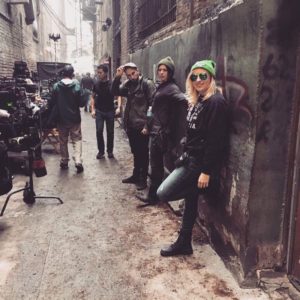
PZ: What are your favorite movies and TV shows?
MY: I love Grease, Across the Universe, Cloud Atlas, Mean Girls, and Clueless. I love old Hollywood films like Rebel Without a Cause and West Side Story. For TV shows, there’s Schitt’s Creek, Downton Abbey, The Office, Friends, and Supernatural. Also, The Dick Van Dyke Show is one of my favorites. I pray I get to meet that man before he passes.
PZ: How about non-film hobbies and interests?
MY: I love painting. I’ve discovered I have a natural talent for it that I was completely unaware of until I put paint to canvas. I showed my mom and was like “Holy crap I didn’t know you could do this!” And I was like “Yeah, me neither!” (Laughs) I really like writing. Poetry is kind of an outlet for me, it helps me to process everything that’s going on and stay grounded, especially if I’m going through heavy emotions, it’s a nice release for me. I enjoy photography, I like giving my friends photoshoots. I love pilates and cooking, but I hardly ever have time to cook. One of my favorite things to do is to cook for a group of people.
PZ: What would you say was your hardest day ever on set and how did you handle it?
MY: I was on a particular show one day, I won’t mention which one it was. The ADs were being particularly cruel that day. I was physically exhausted. It was a six-day shoot, I was the first PA in and last PA out every day, which I don’t think that was supposed to happen. It had started to rain and the coat I was wearing was not waterproof, so I was getting drenched. The wardrobe department offered me a raincoat, a diving jacket. When the AD saw that wardrobe got me this coat, they got in my face and were screaming at me saying it was my responsibility to come dressed appropriately, not wardrobe’s. It was just unnecessarily cruel and nasty and I was being treated less than a human being. They were essentially punishing me by keeping me in the center of a parking lot while it was pouring and I was soaking wet. That was a particularly tough day for me. Once they broke for lunch, I went to my car, broke down, cried like a really deep cry, and I questioned everything. Why I was out here? Why was I working minimum wage for a job that was treating me with little to no respect? I just pulled myself together and finished out the day. I believe that was my last day I ever worked on that show, which was good because I never want to work with that AD again.
After that, I went home to regroup and visit my family at home. Then I came back to LA, got more work, and worked with an AD that actually made a point at the end of the day to ask me for my information and wanting me to work with her all the time. She complimented me on my work ethic and abilities. It was a moment where I was like “Oh okay, so I don’t suck. That one particular AD was not a nice person. It wasn’t all my fault.” It gave me hope again and restored my confidence. So I continued to get good work and make a good reputation for myself. That particular AD has never crossed my path again and I hope it stays that way. So that was probably my hardest day on set, but it made me stronger in the long run. It is not lost on me how incredibly fortunate I have been in my career so far. I am extremely grateful.
PZ: Where do you see yourself in ten years?
MY: Well I’ll be almost 40, so hopefully more settled down. I’d like to be a mom one day. The one thing in my life that I never ever want to be is dependent on another person. I actually want to be successful enough in my own right that I could live my own life, and have my family. Worst case scenario, if God forbid something doesn’t work out with the father of my children, I have no problems just walking away.
PZ: Any advice to anybody who wants to get into the industry?
MY: Networking is where it’s all at. Getting your foot in the door is the most important thing. Once it’s in the door, just continue to be yourself. People can sense when you’re being phony or not being genuine and it’s a total turn off. When you’re kind, have a good work ethic, and know how to hustle, and also stay leveled and keep your cool and manners, then all of that really plays into helping you build networks. People wanna work with good people, happy people. I think that’s kind of been what’s helped me the most: working with people who can appreciate that I can have a good attitude and get the job done at the same time.
PZ: So you mentioned you’ve mentioned you just started a new project. What is it?
MY: I’ve just begun work as the VFX coordinator for Space Jam 2!

